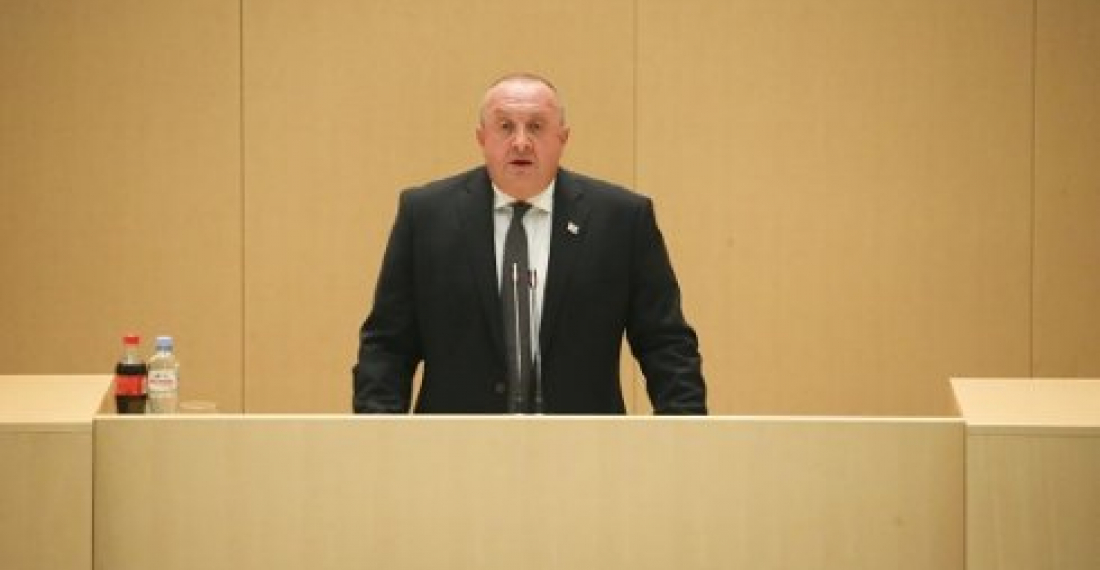The President of Georgia, Giorgi Marghvelashvili has called for the development of an anti-annexation policy, developed with the active engagement of Georgia's allies to counter Russian moves to annexe the separatist regions of Abkhazia and South Ossetia. Speaking in Kutaisi on Friday (7 April), in his annual address to the Georgian Parliament, President Marghvelashvili addressed a wide range of domestic and international issues, and called on politicians to listen to the people.
You can read the full speech of the president of Georgia here
Referring to the situation in Abkhazia and South Ossetia, the President of Georgia said,
The non-recognition policy is an excellent example of cooperation and efficient policy with our partners, which is successfully pursued by the Georgian state and its partners. In response to our success, the Russian Federation takes actions towards the factual annexation of Georgia's occupied territories. Therefore, as in the case of the non-recognition policy, it is necessary to create the Anti-Annexation policy of Georgia's occupied territories with an active engagement of our allies and take coordinated steps to deter the annexation.
At the same time, we have to react promptly on new dividing lines and installation policy of barbwires, cases on the prohibition of education in Georgian language in Gali schools, as well as kidnapping and destructions of our cultural heritages. We have to be firm and united on such important issues of our country.
Marghvelashvili used the speech to also address directly people in Abkhazia and South Ossetia,
Hereby, I would like to address our citizens in the occupied territories - no one would have imagined the fall of Berlin Wall and the leader of the united Germany, becoming a citizen of the Eastern Germany. I hope that one day artificially built walls will be destroyed and the leader of the united Georgia, living beyond the wall will become a Georgian citizen. Time will come when divided society of Abkhazia and Tskhinvali regions will be united, when Georgians, Abkhazians and Ossetians will be able to find the one, who will unite us, when the refugees will return home safely.
The speech came only days before voting is taking place in the self-declared republic of South Ossetia to elect a President, and change the name of the territory. The move has been condemned by the international community. A statement by the spokesperson of the European Union stated:
The European Union does not recognise the framework in which the so-called Presidential elections and the referendum on amending the name of the Georgian breakaway region of South Ossetia are due to take place on 9 April.
The European Union reaffirms its commitment to a peaceful resolution of the conflict in Georgia, including through its co-chairmanship of the Geneva International Discussions and the EU Monitoring Mission.
The European Union reiterates its firm support for the sovereignty and territorial integrity of Georgia within its internationally recognised borders.
A statement by the United States Embassy in Tbilisi on Friday said,
The United States condemns and does not recognize the results of the illegitimate elections conducted in Abkhazia on March 12 and March 26 or the election planned for April 9 in South Ossetia. The United States also condemns the decision to hold a referendum on April 9 regarding the amendment of South Ossetia's constitutional name to the Republic of South Ossetia-Alania.
These illegitimate elections and referenda are being conducted in Georgian territory without the consent of the government of Georgia. The United States fully supports the territorial integrity of Georgia and its sovereignty within its internationally recognized borders. Our position on Abkhazia and South Ossetia is clear and consistent. These regions are integral parts of Georgia.
source: commonspace.eu
photo: President Giorgi Marghvelashvili of Georgia making his annual address to the Georgian Parliament, in Kutaisi on 7 April 2017. (Picture courtesy of the press office of the president of Georgia)






